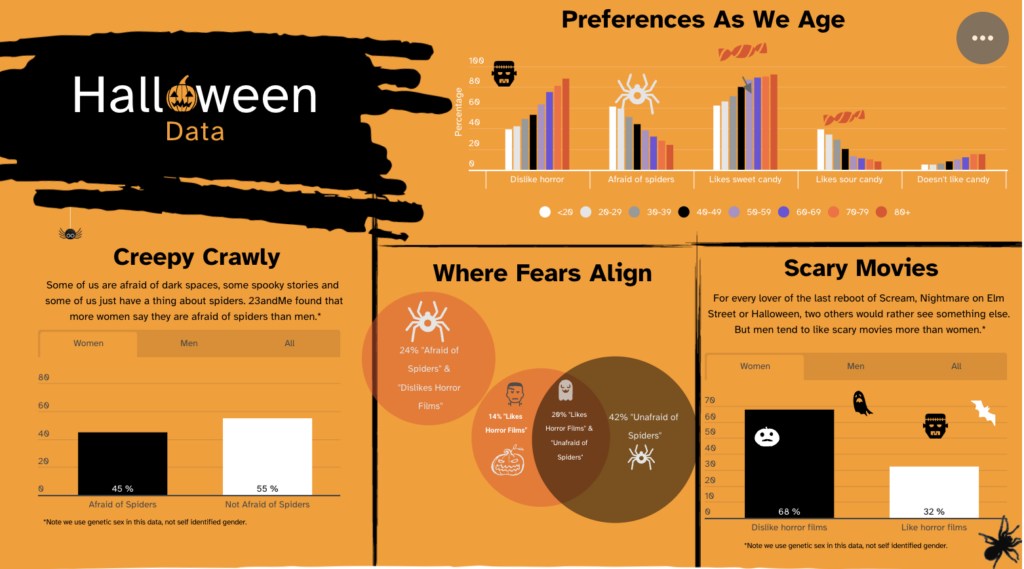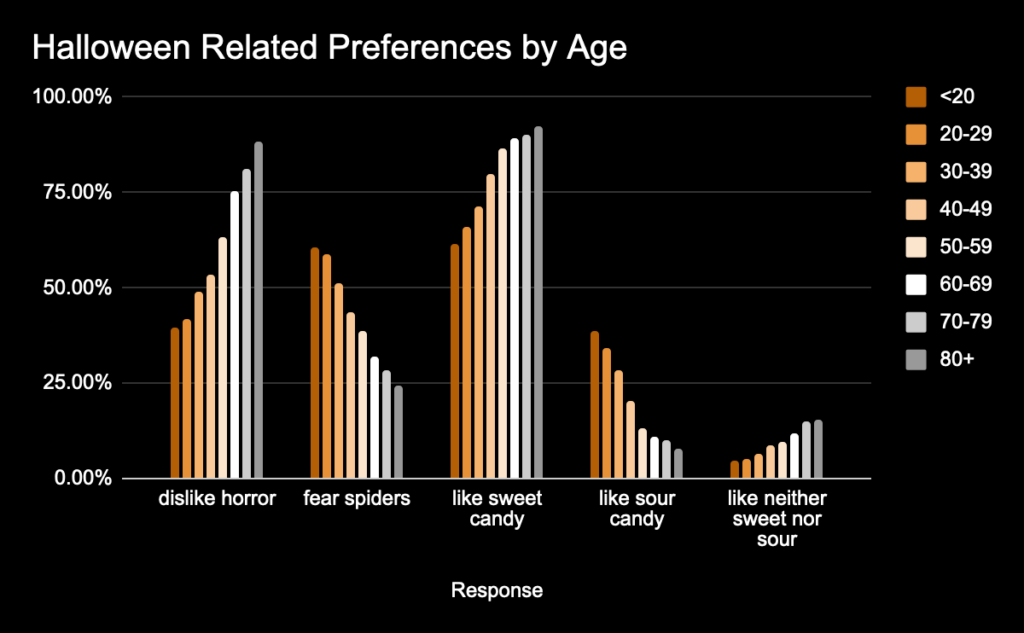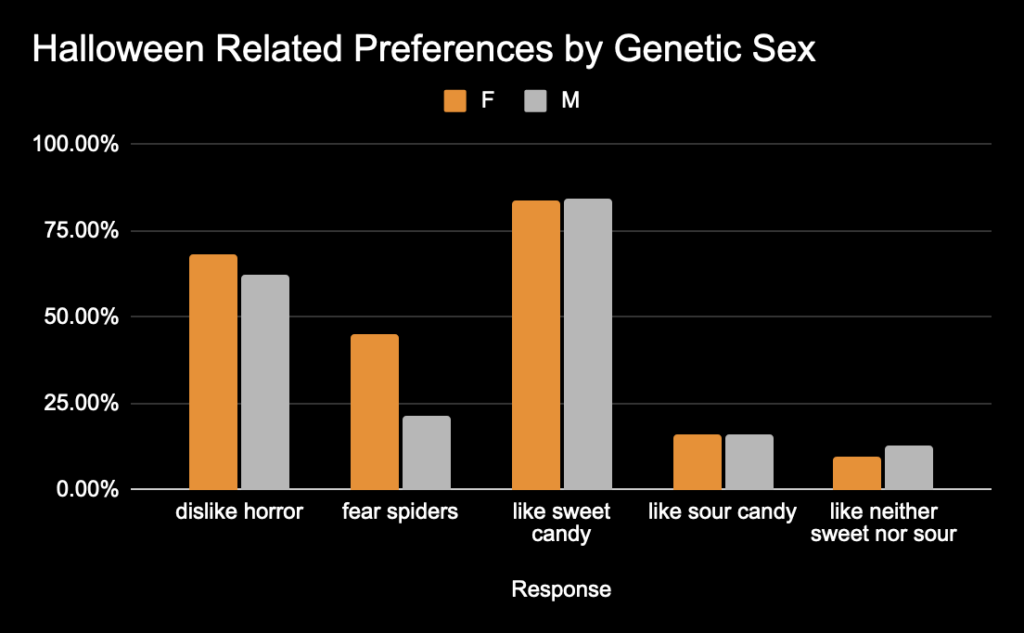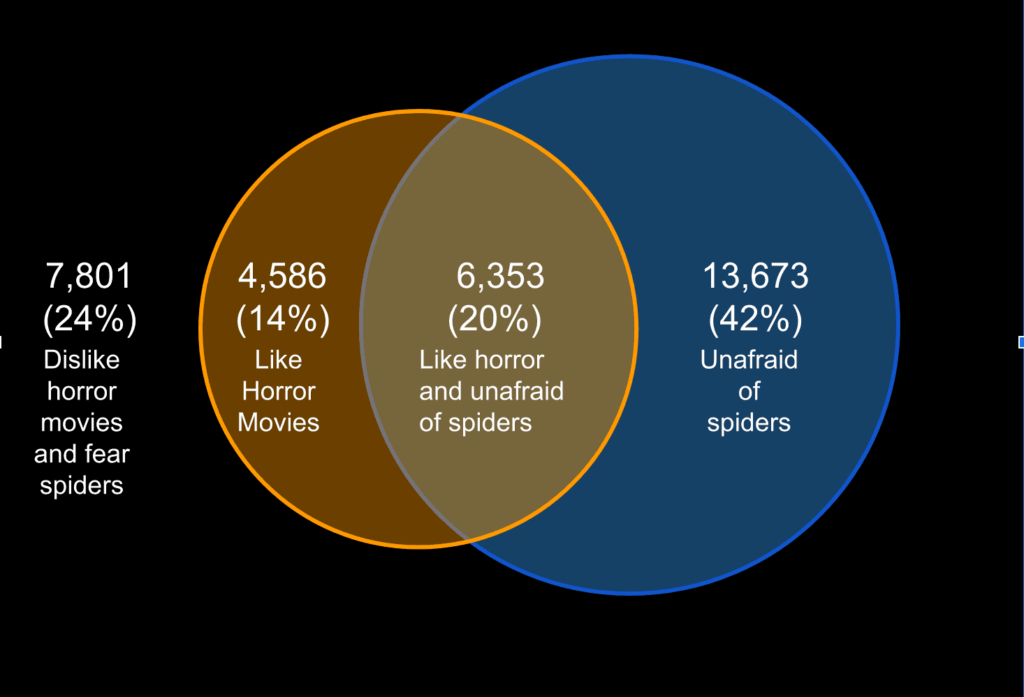We know Halloween is scary good, and that’s not because of pumpkin spice.
So, what gives?
There are the costumes, the candy, and the usually risk-free thrill of something scary, or the chance to scare the heck out of somebody else. But why do we like it so much?
As fans of this time of year, a few of our scientists dove into the data to take a closer look. They wanted to know just how much people say they fear creepy crawly spiders or love horror films, or whether they prefer the sweet taste of, say a Snickers bar, over the tang of a Sour Patch Kids candy.
We looked at the data to see what it says about fear, taste, and attraction to the thrill of something scary. Here’s what we found.

Fear and loathing
At 23andMe we ask all sorts of questions about everything from whether you can curl your tongue or do a cartwheel. This is because it adds to our understanding of human traits, behavior, and in some cases human health.
While this was a fun exercise, it also did reveal some interesting associations between certain fears and mental health-related conditions. So we saw that those who reported a fear of spiders also were much more likely to have a fear of heights, as well as a likelihood to have anxiety and depression.
If you do have a bit of arachnophobia, you’re not alone. A lot of people are afraid of spiders, about 22 percent of the population say they have that fear, according to Chapman University Survey of American Fears. 23andMe’s data shows a higher percentage of people say they are afraid of spiders, about 38 percent, but the surveys are done differently. The annual Chapman survey includes questions about a large number of fears. A fear of spiders ranks among fears just behind a fear of snakes, but ahead of murder hornets.
Since that, all sounds like the plot line for a scary movie, that brings us to, well, scary movies. Despite our fears, some of us are actually attracted to horror films. From a scientific point of view, we see that this may be another form of thrill-seeking or risk-taking, which may in turn also reflect on behavior.
Age matters
A lot changes as we get older, and it’s not just attitudes, hair lines and wrinkles. As we age, it appears that the years lessen certain fears, and change our perceptions and tastes in everything from the food we eat to the films we watch. These trends are very distinct in the data.
As we age, some of our fears — at least in the case of spiders — fade. Perhaps we focus on bigger things or just put things into perspective.
And maybe as we age what also fades appears to be any thrill from seeing a scary movie. In truth, most 23andMe customers who consented to participate in research — more than half surveyed — actually say they don’t like horror movies, but age matters.

More than half of people under 30, about 60 percent, say they like scary films. So, expect more reboots of movies like Scream, Halloween, and, yikes, Saw. As a side note, in looking at those who said they liked the “Horror” genre we saw an association with depression, smoking, and a lack of religiosity.
Breaking down the data by age we see that with every decade the taste for a devilishly scary movie diminishes. By the age of 60 more than three-quarters of people say they dislike horror films.
One surprise, although maybe it shouldn’t be, is that it’s not just our film tastes that change with age. So too do our candy preferences. The older you get, according to our data, the more likely you prefer sweet candy over sour. This might actually reflect changes in our taste buds as we age.
Both our genetics and our environment shape our taste preferences, whether we like salty or sweet snacks, for instance, or our bitter taste perception. But our taste perceptions also change as we age.
There are multiple factors for this including physiological ones that can dull taste receptor cells. Some studies indicate an age-related decline in sweet and salty taste perception, but with contradictory results. Our data indicate that as people age they report liking sweet candy more than sour ones.
Genetic sex matters
We also saw differences in responses between males vs females, defined here solely by chromosomal sex, not necessarily sex assigned at birth or gender identity.
More men than women said they liked horror films, but they were not popular with either men or women. About 37 percent of men said they like horror films, and about 32 percent of women felt that way but a majority of both men and women said they disliked scary movies.

As for a fear of spiders, we also saw a difference but a majority of both men and women said they weren’t afraid of spiders. Only about 22 percent of men said they were afraid of spiders and about 45 percent of women said they were afraid of them.
The horror
Mapping some of this data into a sort of Venn diagram of fears we see that there are a chosen few — about 20 percent of those surveyed — who describe themselves as brave, not afraid of spiders, and fans of horror films.

Perhaps Halloween is ideally made for them, but even those of us who are fearful, don’t like scary movies, and are afraid of spiders can at least look forward to candy.
We plan to continue to collect these data over time. We also hope to look at how genetics might play a role, not just in how we experience Halloween but what these traits might say about mental health conditions and how they might change with age.




